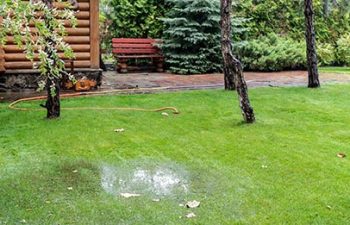
If you have a septic tank, then you also have a drainfield on your property. A drain field is a critical component of your septic system, as it helps to remove, manage and filter the wastewater that is pumped out of your septic tank. This area of land consists of soil, gravel and perforated pipes that are buried 2-3 feet underground. Drain fields need proper care and maintenance like any other part of your septic system.
Keeping a drain field in good working order means protecting this area of your property so that it retains its ability to remove and filter wastewater. This means not building, parking your car or operating heavy machinery on top of the drain field. While it may seem harmless, certain certain plants and trees are also not advised.
Gardening is a No-Go
We know it is tempting. You have a big area of land that is getting full sunlight throughout the day. Your drain field could be the perfect spot for a garden. Not so fast – gardening on top of your septic drain field can pose serious risks to your family. There is no guarantee that the soil of your drain field is not contaminated with pathogens from your wastewater, and this is not an environment that you want to grow your family’s food!
Many homeowners may want to get around this issue by simply planting a raised garden bed. Unfortunately, the added soil depth that you create to keep your crops safer can impede proper evaporation in your drain field and compromise the effectiveness of your septic system.
Are There “Drain field Safe” Plants?
The good news is that you don’t necessarily have to live with a barren or unsightly drain field. You can still have some greenery over this area of your property with a couple of pre-requisites – it must have shallow roots and not demand frequent watering.
The root structure of the plants or grasses you plant on your drain field are very important. Roots that grow too deep or wide can protrude the drain field pipes and cause damage or clogs. In addition, your drain field shouldn’t get excess water so that its effluent can successfully evaporate. Try to select plant varieties that are native and don’t typically require a lot of watering.
The right type of shallow-rooted plants can actually be helpful to your drain field. Certain perennials and grasses will remove excess moisture and nutrients from the soil, including phosphate and nitrate that are commonly found in effluent and are known for contributing to algae growth. Shallow roots can also help to hold the drain field soil in place during heavy rains.
Not sure about what to plant over your drain field? Call the expert of Metro Septic for help. We are your top choice for septic maintenance – which includes protecting and managing all components of your system!

